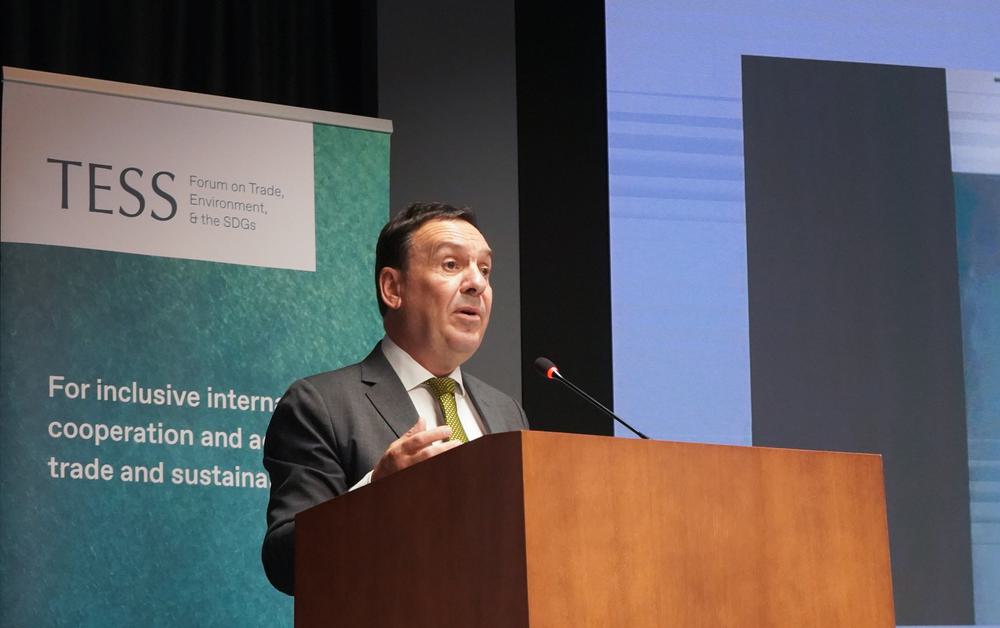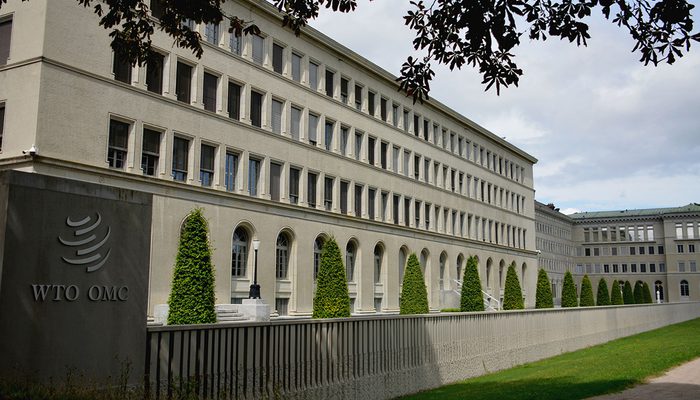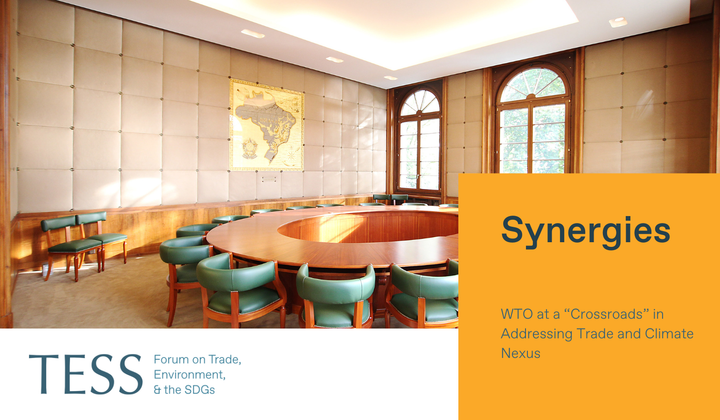On 9 September, in his opening remarks at Geneva Trade Week’s opening plenary hosted by TESS, WTO Deputy Director-General Jean-Marie Paugam said that WTO members could consider new approaches towards acting concretely on trade and environment objectives whereas failures in multilateral cooperation could lead to trade fragmentation. DDG Paugam said that the WTO framework can adapt to members’ diversity of preferences for environmental protection objectives. The text of his remarks is below.

Excellencies,
Ladies and Gentlemen,
Dear friends,
Thank you for the privilege to be here. It is always good to come here for one of the important discussions about trade and environment that are happening in Geneva.
I want to dedicate these few minutes to take a broad overview of where we are at the WTO and what are the options for moving forward.
As we speak today, the environment and the policies of transition towards a sustainable economy are already transforming the trade flows and trade capacities of nations. Nations engaged in trade are facing an upheaval in their comparative advantages. Climate change alone has game-changing consequences for trade and the functioning of global value chains. Sustainable and pro-climate policies now tend to hold the upper ground against classical international trade and finance policies.
This transformation generates opportunities and threats for globalization. Of course, we at the WTO Secretariat are aiming for the best: that is leveraging the opportunities from this transformation into a better and more inclusive globalization. This is the meaning of “re-globalization” a concept coined by our DG, Dr. Okonjo-Iweala, which is the theme of our Public Forum this year.
One example can help quickly visualize what we mean: green hydrogen is being identified as a very promising source of decarbonated energy and countries endowed with great renewal energies potential, such as on the African continent for instance, are well placed to grasp these opportunities of green industrialization. But this is not guaranteed and nothing will be given. So, globalization policies must be leveraged to make it happen.
Here is where multilateral cooperation can make a difference in shaping the global future. As usual there are two possible routes: one is upstream multilateral cooperation and coordination of policies; the other is the spontaneous order resulting from market dynamics and individual sovereign policies.
On the trade and environment nexus, the WTO has experience with both routes. It all started back in 2001 in Doha.
The first route, that of multilateral cooperation, was initiated then with the launch of negotiations for the reform of harmful fisheries subsidies. Those have lasted more than 20 years, and really were accelerated when they were elevated to the level of a Sustainable Development Goal in 2015. This negotiation landed in 2022, with a first and historical agreement directing the elimination of subsidies to vessels practicing illegal or illicit fishing. We hope to soon see the entry into force of this agreement after an incredibly fast effort of ratification by WTO members. And we are an inch from concluding the second chapter of this negotiation on subsidies contributing to the depletion of fish stocks. This agreement is the first of a kind within the WTO since it is the first trade agreement to be motivated by sustainability objectives.
Yet multilateral cooperation is not an easy path. It can easily fail and then give way to the other route.
The second route is spontaneous evolution and order which can sometimes be a result of blockages on the multilateral cooperation route. For instance, you will recall that at the same time as the launch of the fisheries negotiations in Doha, we also launched two other negotiations aiming at enhancing mutual supportiveness between trade and the environment: one was for the liberalization of environmental goods and services and the other one for the clarification of the relations between WTO rules and specific trade obligations from the multilateral agreements on the environment. Long story short, these negotiations were abandoned, and their matters left to spontaneous evolution, outside of the WTO. What happened?
The liberalization of environmental goods and services has partially happened, here and there, mainly through regional and bilateral trade initiatives. The multilateral environmental agreements and their trade components have been implemented within the framework of individual country measures. Their scope and magnitude have greatly accelerated with the Paris Agreement on climate and the Convention on Biological Diversity.
This happens outside of the WTO and the results of this spontaneous dynamic is clearly suboptimal. It has become a major matter for concern for our members: uncoordinated trade measures have a potential to restrict or fragment trade flows in a manner which can be detrimental both to trade objectives and environmental objectives. Testimony of this concern can be heard almost every day now at the WTO.
Ladies and Gentleman, this is exactly where we are, at a time when we celebrate the 30th year of our multilateral trading system and contemplate the challenge of “re-globalization.”
The cooperation route remains but has not been used to move to action. It is up to our members to choose to engage in it. What are the arguments in favour of this choice?
First, the why: is it worth the effort? This question is very important because it holds the key to all the others. The answer is yes, rewards will be there, either under the form of public goods or private benefits for the participants.
There is a clear lesson that the history of the fisheries negotiation teaches us: forget trying to negotiate trade concessions against environmental commitments, you are doomed to fail. Nobody has shown any intention of paying anything with agriculture, industry, or services for the preservation of fish! By definition a public good cannot be bought. But it can be preserved through multilateral cooperation and equitable burden sharing.
Here there is a need to change traditional WTO negotiating approaches and tactics whereby the objective of the negotiations is to exchange concessions, trade or otherwise.
To measure the benefits of engaging in cooperation, members must look at other types of rewards. Some key examples of such rewards can be found in the trade agreements recently concluded in the WTO. Fish: the reward is clearly a public good. Domestic regulation on services: the reward is trade facilitation. Investment facilitation for development: the reward is improved attractiveness of participants’ economies. In none of these agreements are there any classical trade concessions attached to the commitments made. Members are making these commitments out of self-interest, because they believe it will strengthen the efficiency and attractiveness of their economies. The same thinking can and must apply to sustainability: a green economy will be a better performing, more innovating, future-oriented, and attractive economy.
Second question, the what: What is feasible? Today, things are technically ripe for answering this question. A considerable amount of technical work has been carried out over the last three years in the context of the three plurilateral dialogues within the WTO: the Trade and Environmental Sustainability Structured Discussions (TESSD) and the Plastics and Fossil Fuel Subsidy Reform initiatives. These dialogues have produced an incredibly rich mapping of the interactions between trade and the environment on a wide variety of subjects. External stakeholders have commendably contributed to this work. Many practical trade measures have been identified that can be implemented without delay by every willing member.
Third, the how: how to manage the political and legal risks of engaging in cooperation? The WTO legal framework offers a full range of possibilities to adapt cooperation to the comfort zones and policy space of each member: the WTO framework can accommodate multilateral, plurilateral, regional, or unilateral trade measures, as long as they are not unduly restricting trade; it can accommodate, soft-law, hard-law, transition period, opt-in and opt-out clauses, and all types of flexibilities to provide comfort to members in adjusting their level of commitment; it can accommodate diverse sectoral preferences or appetite from members, and of course special and differential treatment, should they want to move faster on one issue rather than another.
In a nutshell, the WTO can adapt to the diversity of situations entailed by environmental protection objectives. Therefore, a possible approach would possibly be to negotiate a pool of various options to achieve the same environmental objective, and then use them for national pledges, on a voluntary basis. Pledges taken together would then represent a valid multilateral outcome that testify to the efforts made and have a domino effect on others.
Ladies and Gentleman, whatever happens in the field of multilateral cooperation, the economy and trade will be turning green. The question is whether the trade consequences of this transition will be optimized or left to the unknown.
Over the last two years, this question and the perception of the risk of global fragmentation have underpinned close to 20 different members' proposals for starting new discussions in the WTO Committee of Trade and the Environment. These proposals seem to all point towards one same general objective: using the convening power of the WTO to find some commonalities in environmental policy approaches so as to avoid unnecessary economic cost and enhance environmental policy efficiency. As we walk our path to our future ministerial meeting in Cameroon, there is here a clear and concrete opportunity to walk the talk.
Ladies and Gentlemen, two years ago I was addressing your honourable audience and I then articulated my message by using a reference to an old Miles Davis tune entitled “It’s about that time”. I think I can update this today by referring to an even older jazz masterpiece, from Charlie Parker, which will sum up my plea for action on our way to MC14: “Now’s the time”.
Thanks a lot for your time and attention.
-----
This speech was first published on www.wto.org.
TESS at the World Trade Organization
This work is part of our initiative supporting inclusive cooperation
on trade, environment, and sustainable development at the WTO.




